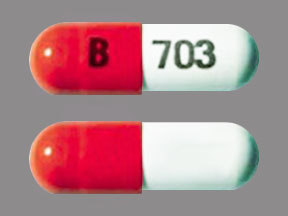Ferrex 150 Plus Side Effects
Generic name: ascorbic acid/iron polysaccharide
Note: This document contains side effect information about ascorbic acid/iron polysaccharide. Some dosage forms listed on this page may not apply to the brand name Ferrex 150 Plus.
Applies to ascorbic acid/iron polysaccharide: oral capsule.
Warning
Do not take more ascorbic acid and iron polysaccharide than is prescribed for you or than is directed on the package.
Keep this product out of reach of children. Accidental overdose of iron-containing products is a leading cause of fatal poisoning in children under 6. In case of accidental overdose, call a doctor or poison control center immediately.
Ascorbic acid and iron polysaccharide may decrease the absorption of other medicines. Talk to your doctor and pharmacist before taking ascorbic acid and iron polysaccharide if you take any other prescription or over-the-counter medicines.
Get emergency medical help if you have any of these signs of an allergic reaction while taking ascorbic acid/iron polysaccharide: hives; difficulty breathing; swelling of your face, lips, tongue, or throat.
Stop using this medication and call your doctor at once if you have a serious side effect such as:
-
severe lower back pain;
-
painful or difficult urination;
-
blood in your urine; or
-
black or dark stools.
Less serious side effects of ascorbic acid/iron polysaccharide may include:
-
constipation; or
-
temporary staining of the teeth.
This is not a complete list of side effects and others may occur. Call your doctor for medical advice about side effects.
For Healthcare Professionals
Applies to ascorbic acid/iron polysaccharide: oral capsule.
Gastrointestinal
Nausea, diarrhea, and abdominal cramps have been reported to be associated with ascorbic acid doses exceeding 2 g per day, although there have been some reports with as little as 1 g per day.
Esophagitis has been reported to be associated with prolonged or increased contact of ascorbic acid tablets with the esophageal mucosa.
Constipation from iron may be relieved by administering docusate sodium 100 mg to 200 mg per day in addition to increasing the intake of oral fluids, such as water.[Ref]
Gastrointestinal side effects of ascorbic acid have included nausea, diarrhea, abdominal cramps, and esophagitis. Gastrointestinal side effects of iron polysaccharide have been reported the most frequently. They have included nausea, vomiting, diarrhea, constipation, abdominal pain, flatulence, and heartburn.[Ref]
Renal
Renal side effects of ascorbic acid have included oxalate and urate kidney stones.[Ref]
Hyperoxaluria with ascorbic acid is reported to be dose-related.[Ref]
Nervous system
Nervous system side effects of ascorbic acid have included dizziness, faintness, fatigue, and headache in less than 1% of patients. Migraine headache has also been reported with ascorbic acid.[Ref]
Migraine headache has been reported with a daily dose of 6 grams of ascorbic acid.[Ref]
Other
Conditional scurvy is reported to occur following excessive doses of ascorbic acid over a prolonged period of time. The mechanism of action for this condition is thought to be that large doses of ascorbic acid condition the patient over time for rapid clearance of ascorbic acid resulting in scurvy. The plasma levels of ascorbic acid appear to remain within normal limits. The actual existence of conditional scurvy remains controversial.
Iron overload (i.e., hemosiderosis) has been reported in patients genetically predisposed, or have underlying disorders, that augment the absorption of iron. It has also occurred following administration of excessive parenteral iron therapy, combination of oral and parenteral iron, or in patients with hemoglobinopathies that were erroneously diagnosed as iron deficiency anemia. Hemosiderosis is treated with repeated phlebotomy or long-term administration of deferoxamine. The liver is particularly susceptible to toxicity in iron-overload states.[Ref]
Other side effects from ascorbic acid have included flank pain in less than 1% of patients. Conditional scurvy has also been reported. Other side effects of iron polysaccharide have included iron overload (hemosiderosis). Secondary hemochromatosis due to prolonged iron ingestion has been reported rarely.[Ref]
Hematologic
Hematologic side effects of ascorbic acid have included hemolysis.[Ref]
The majority of hemolysis reports have been associated with patients receiving ascorbic acid who had concurrent glucose-6-phosphate dehydrogenase deficiency.[Ref]
More about Ferrex 150 Plus (ascorbic acid/iron polysaccharide)
- Check interactions
- Compare alternatives
- Drug images
- Dosage information
- During pregnancy
- Drug class: iron products
Related treatment guides
References
1. Levine M, Dhariwal KR, Welch RW, Wang Y, Park JB. Determination of optimal vitamin C requirements in humans. Am J Clin Nutr. 1995;62(6 Suppl):s1347-56.
2. Hathcock JN. Vitamins and minerals: Efficacy and safety. Am J Clin Nutr. 1997;66:427-37.
3. How much vitamin C do you need? JAMA. 1999;281:1460.
4. Glassman E. Oral iron therapy with ferrous fumarate and polysaccharide iron complex. ANNA J. 1992;19:277-8,323.
5. Wingard RL, Parker RA, Ismail N, Hakim RM. Efficacy of oral iron therapy in patients receiving recombinant human erythropoietin. Am J Kidney Dis. 1995;25:433-9.
6. KleinSchwartz W. Toxicity of polysaccharid-iron complex exposures reported to poison control centers. Ann Pharmacother. 2000;34:165-9.
7. Multum Information Services, Inc. Expert Review Panel
Further information
Always consult your healthcare provider to ensure the information displayed on this page applies to your personal circumstances.
Some side effects may not be reported. You may report them to the FDA.

